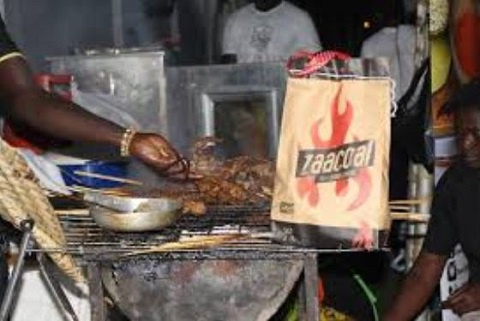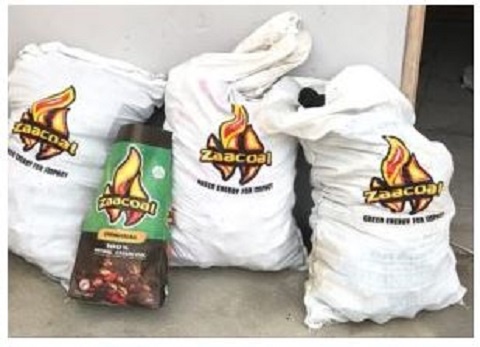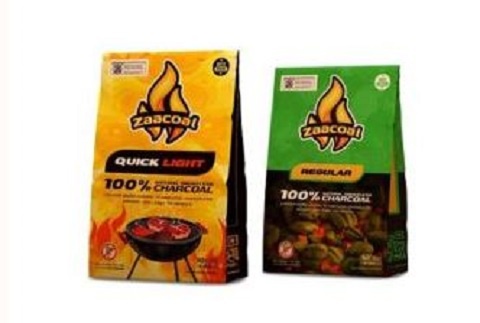 Amin Sulley Abubakar, CEO of Zaacoal
Amin Sulley Abubakar, CEO of Zaacoal
Jane Goodall, a British Primatologist, once said: “You cannot get through a single day without having an impact on the world around you. What you do makes a difference, and you have to decide what kind of difference you want to make”.
True to these words, a young man by name Amin decided to make a difference in society with coconut waste.
But you will find it more interesting after learning that his innovation came from a ‘common’ kenkey seller.
Read as he shares his story with your favourite column in the B&FT—Inspiring Startups.
Who is Amin?
Amin Sulley Abubakar was born in Accra but raised in Sunyani by his grandfather, who was a military man. Young Amin began his education at the Military Barracks School and went on to Sunyani Senior High School for his secondary education. Thereafter, he obtained a Higher National Diploma (HND) in Accounting from Sunyani Technical University. He then moved on to the University for Development Studies (UDS) where he graduated with a Bachelor of Arts in Development Studies in 2012.
His academic prospects did not end there, though. He further went to the Zenith College to pursue a two-year course in Law. It’s as if Amin just enjoys multi-tasking, because around the same period he was thinking about starting a business – only he didn’t know what kind of business he should invest in.

The kenkey-seller’s role
What catapulted his desire to start a business was when he lost out on being retained at the Ministry of Communication as a permanent employee. That prompted him to begin looking for options.
He observed one day when on the Oxford Street at Osu, a suburb of Accra, coconut sellers at every junction. Then it sparked his curiosity as to where they dumped the shells and husks.
He got to know they were dumped behind the Independence Square in Accra. He kept wondering what could be done with this coconut waste to make it more useful to the economy instead of just contributing to the filth in Ghana.
Definite answers were not coming until one day he met an ‘angel’ — a kenkey-seller. Just for the sake of our readers who may not be aware of kenkey, it is a Ghanaian meal made with corn and shaped in a ball-like form which is often eaten with fish and chilli-sauce.
To his surprise, this kenkey-seller in his neighbourhood was using coconut shells and husks as a source of energy rather than the usual firewood.
As if he had seen gold, Amin quit studying law, even though he was in his final year, and travelled to the Upper West Region, Wa, to study the process of making charcoal by the rural women. After learning the process, he went back to Accra to test it with the coconut shells and husks. Then he gave them to the market women to use and give him feedback. When the feedback was positive, he decided to enter the business full time.

Zaacoal on the move
Amin communicated his idea to a friend called Zach. He also saw it as a good business venture, and both partnered to bring the business into fruition.
In 2014 they registered the business with the name Zaacoal. Today, they supply charcoal made of coconut waste to charcoal sellers in Fadama, Abeka, North Kaneshie and some parts of Lapaz, all suburbs of Accra. Their environment-friendly business has earned them a contract to supply charcoal to one of the prestigious shopping malls in Ghana—the Marina Mall.
What’s more, the charcoal is packed in very attractive packages – so that if one does not observe carefully it may be mistaken for a food product.
Mode of marketing
Yes, we know social media will come top of all, because in this modern era it would be very damaging for companies – especially small businesses – not to take advantage of free advertisement on social media. The business has accounts on social media platforms such as Facebook and Instagram.
Another marketing technique used by Zaacoal is personal selling, whereby it supplies directly to market women.

Vision
Zaacoal wants to convert ubiquitous city waste into clean-burning fuels. The coconut waste, according to Amin, is just a stepping-stone to introduce more innovative fuels that will not harm the environment.
The company wants to also expand and supply environment-friendly fuels to large firms and organisations across the country.
Challenges
Financial constraints, of course, cannot be overlooked as part of the problems of many SMEs. Zaacoal is no exception. It has reached a stage where demand has now exceeded supply, but because of financial constraints, it has become difficult to meet market demand.
How government can help
The best support, Amin says, government can provide to local industries is to patronise Made in Ghana goods. This, he says, will boost local demand and encourage small businesses as it will instil confidence in locally made products.

How education has helped
Amin believes his education has helped him greatly in making Zaacoal a successful business. As a person who has his MBA in entrepreneurship, he has been psyched that trying and failing shouldn’t allow one to give up on his dreams in life. Failing provides humans the greatest opportunity to learn and plan better next time. Because of this mentality that his education gave him, he is never afraid to try and press-on the idea to success.
Advice to the youth
Amin’s advice to the youth is that entrepreneurship, he believes, is not for everyone; but everyone should try it, and is worth all the failure. He adds that: “To make it in this field, the youth must be willing to solve a problem”.